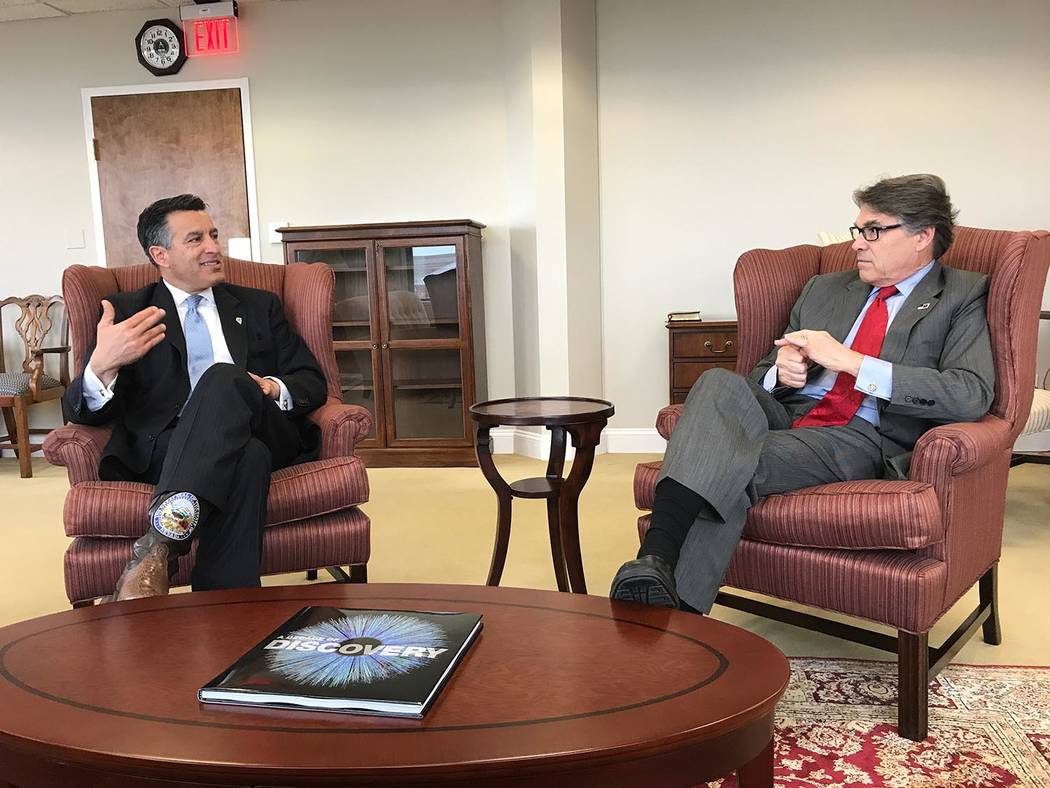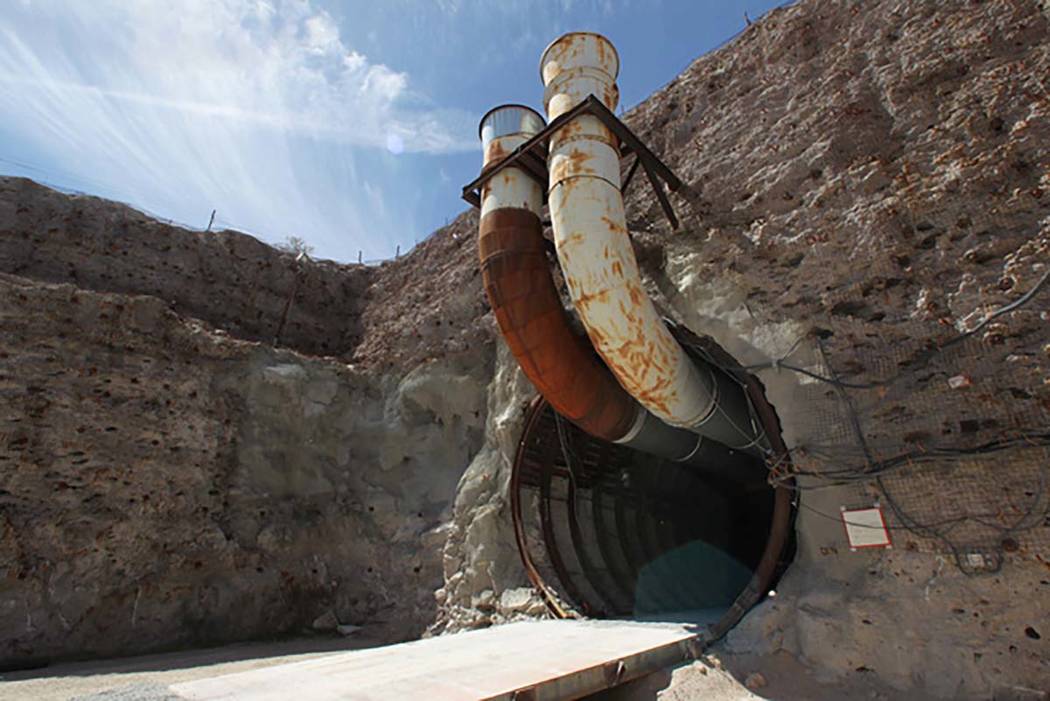Nevada leaders stay united in opposition to Yucca revival
WASHINGTON — A congressional battle was renewed Wednesday when a House panel held its first hearing this year on reviving the mothballed Yucca Mountain nuclear repository in Nevada’s Nye County.
The U.S. House Energy and Commerce subcommittee on environment called on experts who said that obstacles to opening the Yucca Mountain site, defunded and closed in 2012, were difficult but could be overcome and urged Congress to begin the licensing process on the Nevada site.
Funding, water rights, transportation of spent nuclear fuel, and fierce political opposition by state officials were all listed as some of the concerns that plagued continuation of developing the site as a permanent geologic location for storage.
Nevada Gov. Brian Sandoval warned the subcommittee in a letter that the state would fight congressional attempts to revive the shuttered site.
The governor was in Washington on Wednesday and met with members of the Trump Cabinet, including Energy Secretary Rick Perry.
Sandoval has urged the federal government to find an alternative permanent storage site for nuclear wastes.
“While the Secretary and I do not agree on Yucca Mountain, a position I have reiterated to him in every discussion, I am grateful that he has always welcomed an open dialogue and strong relationship between the State of Nevada and Department of Energy,” Sandoval said in a statement.
“Nevada will continue to oppose the storage of high-level nuclear waste at Yucca Mountain at every turn but I am confident that we can also work with our federal partners to develop relationships with our universities, expand a stronger mission at the Security Site, and improve cyber defense for the benefit of our state,” Sandoval said.
U.S. Rep. John Shimkus, R-Ill., the subcommittee chairman, called the hearing a success and said that draft legislation would now move forward.
He said he has spoken to Energy Secretary Rick Perry, and noted that President Donald Trump’s budget blueprint for 2018 includes $120 million to kick-start the licensing process on Yucca Mountain with the Nuclear Regulatory Commission.
Shimkus called the Trump budget a strong signal that development of Yucca Mountain would continue.
“I think we have an administration that wants to comply with the law,” Shimkus told reporters. “I have no doubt that the DOE is fully on board.”
The hearing included emotional testimony from Nevada’s congressional delegation.
‘Heavy-handed’ proposal
U.S. Sen. Dean Heller, R-Nevada, called Shimkus’ draft legislation “a heavy-handed, federal government-only proposal to reinstate Yucca Mountain while making false promises to the residents of Nevada.”
Nevada has contributed to the development of nuclear energy, said U.S. Rep. Dina Titus, D-Nevada, “and we continue to carry those scars decades after the mushroom clouds dissipated.”
U.S. Rep. Jacky Rosen, D-Nevada, and the American Gaming Association, in a letter, said transporting waste to Yucca Mountain would take it through Las Vegas, a national tourist destination that attracts 43 million people annually.
The Yucca Mountain site is in Nye County, about 90 miles north of Las Vegas. Nye and several rural counties want the licensing process to continue.
Nye County Commission Chairman Dan Schinhofen said in a statement that the licensing process is the way to “determine if Yucca Mountain is a secure site for the nation’s nuclear-spent fuel. Today was a big step in that direction.”
But U.S. Rep. Ruben Kihuen, D-Nevada, whose congressional district includes the Yucca Mountain site, told the hearing that the state produces no nuclear waste and should not be the nation’s dumping ground.
“Let’s find a place your district,” Kihuen said.
There are 121 communities in 39 states that are grappling with nuclear waste produced from generating plants, said Rep. Joe Wilson, R-S.C. He said those communities are waiting for the federal government to fulfill its obligation to store the waste at Yucca Mountain, which was designated by Congress in 1987 as the permanent storage site.
The Nuclear Energy Waste Policy Act was first passed in 1982, making it a federal responsibility to dispose of waste from non-military generators. It was amended in 1987 when Yucca Mountain was designated as the permanent site, based on studies then.
President Barack Obama defunded development of Yucca Mountain in 2012, and his administration shuttered the Office of Civilian Radioactive Waste Management at DOE.
Proposed legislation
The draft legislation by Shimkus would re-establish that office. It also provides a legal framework to establish interim storage sites and seeks access to funding to develop Yucca Mountain and complete licensing, said Steven Nesbit with the U.S. Nuclear Infrastructure Council and a policy director at Duke Energy Corp.
Duke Energy produces nuclear-generated energy in the Carolinas.
Edward Sproat, former director of the Office of Civilian Radioactive Waste Management, said the first priority for the government would be to get funding, upwards of $2.5 billion a year, to build the repository.
He said the licensing process with the NRC could take as many as four years because Nevada has filed over 200 contentions that must be addressed.
Although Nevada has denied water to the development of the site, Sproat said Congress could declare the need for water to be in the public’s best interest. He said it could also be obtained through an administrative decision by Perry.
Congress would also have to seek a permanent land withdrawal for the site — 147,000 acres excluded for any future public use.
When asked by U.S. Rep. Joe Barton, R-Texas, whether a new site selection for a permanent disposal would identify alternative locations, Sproat said no. He further said that even with willing host communities, like Nye County, there would likely be political opposition from neighboring communities.
There are 79,000 tons of spent fuel being stored temporarily and subject to environmental disasters and terrorist attacks, said Mark McManus, general president of the United Association Union of Plumbers, Pipefitters, Welders and Service Techs.
Two private contractors in Texas and New Mexico are seeking a license with the NRC to temporarily store the backlog of waste being produced. Neither is considered a permanent storage site.
— The Pahrump Valley Times staff contributed to this story.
Contact Gary Martin at gmartin@reviewjournal.com or 202-662-7390. Follow @garymartindc on Twitter.


















